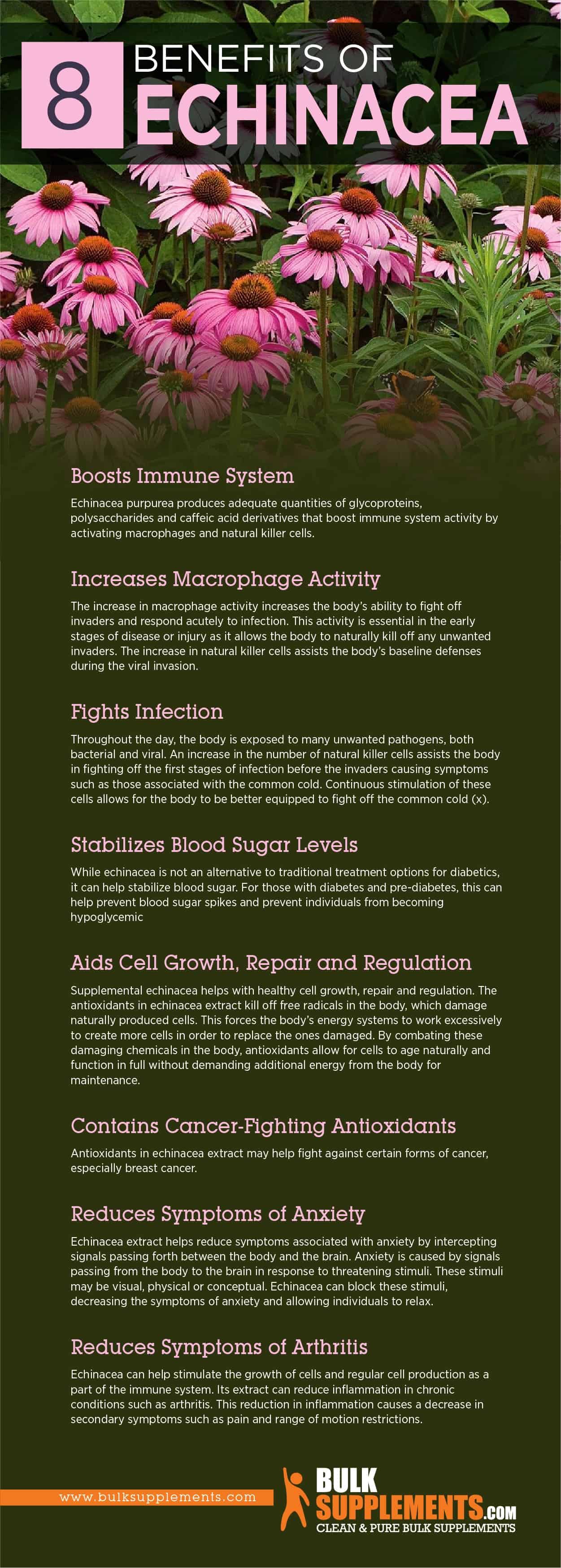Updated: 12/6/23
Are you looking for an effective way to strengthen your health while also protecting yourself against illnesses? Look no further than echinacea extract – a natural supplement derived from the herb Echinacea Angustifolia, with many powerful benefits that can have a positive impact on holistic wellbeing. From boosting immunity and fighting off viruses to calming anxiety and reducing inflammation, this traditional herbal remedy has been in use by natural healers since ancient times for its ability to promote overall wellness. Discover how adding echinacea extract to your daily routine can help enhance your health, so you can stay healthy and strong
What is Echinacea?
Echinacea is a plant that belongs to the daisy family and is native to North America. It is also known as coneflower and has been used for centuries by Native Americans to treat a variety of ailments, including infections, wounds, and toothaches. Nowadays, echinacea is best known for its immune-boosting properties and is often included in natural remedies for colds, flu, and other infections.
Echinacea contains compounds called alkamides, polysaccharides, and flavonoids, which work together to stimulate certain immune cells and increase their activity. This leads to the production of more white blood cells, which are crucial for fighting infections. Additionally, echinacea has anti-inflammatory properties that can help reduce swelling and inflammation in the body.
What is Echinacea Extract?
Echinacea extract is from the echinacea plant, which belongs to the daisy family. The plant is famous for its medicinal properties and has been used for centuries to treat various health conditions such as cold, flu, and respiratory infections. The extract is obtained from the leaves, stems, and flowers of the plant. Echinacea extract is available in various forms such as capsules, tablets, and liquid.
Echinacea extract is famous to contain active compounds such as alkamides, polysaccharides, and flavonoids that give it its immune-boosting properties. These compounds work together to stimulate the immune system, which helps the body fight off infections. Echinacea extract also contains anti-inflammatory properties that can reduce inflammation in the body.
Echinacea Extract Benefits
Immune System Support
Perhaps the most well-known benefit of echinacea extract is its immune system support. Echinacea has compounds that stimulate white blood cells, which can help to strengthen your immune system and combat infection. Studies have shown that taking echinacea extract can reduce the incidence of colds and other respiratory infections, shorten the duration of illness and improve overall immune system function.
Reducing Inflammation
Echinacea extract has powerful anti-inflammatory properties that can help to reduce inflammation throughout the body. Inflammation is a key contributor to many chronic conditions like heart disease, diabetes, and arthritis. By reducing inflammation, echinacea extract can help to prevent the onset of these conditions, as well as improve symptoms for those with existing conditions.
Lowering Blood Sugar Levels
In addition to reducing inflammation, echinacea extract may also help to lower blood sugar levels. This is great news for those with type 2 diabetes, as high blood sugar levels can lead to numerous complications. Studies show that echinacea extract can improve insulin sensitivity and glucose transport, which can help to regulate blood sugar levels.
Enhances Athletic Performance
Echinacea Extract has been found to have benefits for athletic performance as well. It works by increasing the production of nitric oxide, which helps to improve blood flow and oxygen delivery to the muscles.
One study in the International Journal of Sport Nutrition and Exercise Metabolism found that echinacea extract improved running performance in trained athletes. The study’s authors suggest that this is due to the supplement’s ability to enhance oxygen delivery to the muscles.
Better Respiratory Health
If you struggle with respiratory issues like allergies, sinusitis, or bronchitis, echinacea extract may be just what you need. This plant shows to improve respiratory health by reducing inflammation and fighting off infections. It also has a natural antihistamine effect that can help relieve allergy symptoms and make breathing easier. Taking echinacea extract regularly can help you breathe easier and feel better overall.
Improving Skin Health
You may not have thought of echinacea extract as being good for your skin, but it actually has numerous benefits for skin health. Its anti-inflammatory properties can help to reduce skin irritation and redness, while its antibacterial properties make it an effective treatment for acne. In addition, echinacea extract contains compounds that can promote collagen production and improve skin hydration, making it an excellent ingredient for anti-aging skin care products.
Relieving Anxiety and Depression
Finally, echinacea extract has been shown to have positive effects on anxiety and depression. It contains compounds that can help to regulate the body’s stress response and improve overall mood. If you’re looking for a natural way to reduce anxiety or improve your mood, echinacea extract may be just what you need.
Echinacea Extract Side Effects
Upset Stomach
Echinacea extract can cause digestive discomfort, including stomach upset, nausea, and diarrhea. If you are prone to stomach problems, you may want to avoid using echinacea extract, or start with a smaller dose and work your way up gradually.
Allergies
If you are allergic to plants such as daisies, ragweed, or marigolds, you may also be allergic to echinacea. Symptoms of an allergic reaction may include rash, itching, swelling, and difficulty breathing. If you experience any of these symptoms when using echinacea extract, stop using it immediately and seek medical attention.
Headaches
In some cases, echinacea extract may cause headaches or migraines. If you are prone to headaches, you may want to start with a smaller dose of echinacea extract and monitor your symptoms carefully. If you experience headaches after using echinacea extract, stop using it immediately and talk to your doctor.
Interactions with Medications
Echinacea extract can interact with certain medications, including immunosuppressants, blood thinners, and some antibiotics. If you are taking any medications, it is important to talk to your doctor before using echinacea extract to avoid any potential interactions.
Unpleasant Taste
Echinacea extract has a bitter taste that may be unpleasant for some people. To avoid this side effect, you can mix echinacea extract with juice or water to mask the taste.
Pregnancy and Breastfeeding
Pregnant and breastfeeding women should avoid taking echinacea extract. There is not enough information available on the effects of the supplement on fetuses and infants. It is always better to err on the side of caution and avoid taking the supplement during these stages.
Overconsumption
Taking too much echinacea extract can lead to toxicity. The symptoms of echinacea extract toxicity include dizziness, nausea, fatigue, and numbness. To avoid this, it is important to stick to the recommended dosage.
Can Echinacea Cause Diarrhea?
While echinacea is generally safe for most people, some individuals may experience side effects. One of the most common side effects of echinacea is gastrointestinal distress, including stomach pain, bloating, and diarrhea. However, it is important to note that these side effects are typically mild and go away on their own within a few days. If you experience severe or persistent diarrhea after taking echinacea, you should speak to your doctor.
Certain individuals may be more prone to experiencing diarrhea after taking echinacea. These include people with pre-existing digestive issues, such as Crohn’s disease, ulcerative colitis, irritable bowel syndrome, or other inflammatory bowel diseases. In addition, people who are taking certain medications, such as immunosuppressants or antibiotics, may also be at an increased risk of experiencing diarrhea after taking echinacea. If you fall into one of these categories, you should consult with your doctor before taking echinacea.
Can Echinacea Make Allergies Worse?
Some studies have suggested that it may actually worsen allergies by increasing inflammation in the body. Allergies are by an overactive immune response to harmless substances, such as pollen or dust mites. Inflaming the immune system with echinacea could potentially make this overreaction worse and cause more severe allergy symptoms.
Other studies have contradicted these findings, suggesting that echinacea can actually help alleviate allergy symptoms by reducing inflammation and stimulating the immune system. A study published in the Journal of Investigational Allergology and Clinical Immunology found that patients who took echinacea experienced fewer allergy symptoms and required less medication than those who did not.
Why is Echinacea Bad for Autoimmune Disease?
It is known to stimulate the immune system, which is why it is often used to treat colds and other infections. However, this can be harmful to people with autoimmune diseases, where the immune system is already overactive and targeting normal body tissues. Using it can cause the immune system to become even more overactive, leading to increased inflammation and potentially worsening autoimmune symptoms.
Inflammation is a hallmark of autoimmune disease, and it is a belief to be one of the reasons why using echinacea can be harmful. Echinacea has been shown to increase the production of inflammatory cytokines, which are molecules that play a role in the development of inflammation. Increased production of these cytokines can lead to the worsening of autoimmune symptoms and may even trigger a flare-up in some people.
Another reason why it can be harmful for autoimmune disease is that it can interfere with certain medications used to treat these conditions. For example, it can interact with drugs used to suppress the immune system, such as corticosteroids or methotrexate. This makes them less effective. This can lead to increased inflammation and potentially worsen autoimmune symptoms.
Echinacea Extract Dosage
When supplementing with echinacea extract powder, take 450 mg (about 1/4 tsp) twice per day. Of course, be sure to speak with a doctor before adding this supplement to your regimen. If your doctor suggests alternative dosage instructions, it is best to follow their advice.
Where to Buy Echinacea Extract
Get your Echinacea Extract at BulkSupplements.com! We’ve got you covered for all your dietary needs. As an industry leader, we’re all about pure supplements. We formulate our own products and supply top-notch ingredients to other brands in the food and supplement industry. Rest assured, our products are manufactured and tested in accordance with current manufacturing practices. Don’t miss out on the chance to try Echinacea Extract as a dietary capsule supplement. Contact BulkSupplements.com now and place your order today!
The Bottom Line
Echinacea is a traditional herbal remedy for treating a variety of ailments. It is widely used to fight infections, particularly the common cold and the flu. It can also handle other types of infections including urinary tract, ear and throat infections, as well as boils, skin wounds or burns. The benefits of taking echinacea extract include boosting the immune system, fighting infections, stabilizing blood sugar levels, helping with cell growth, repair and regulation and reducing the symptoms of anxiety and arthritis.
It is a powerful natural supplement that has numerous benefits for overall health and wellness. Its ability to boost immune system function, improve respiratory health, reduce anxiety and stress, enhance skin health, and improve athletic performance make it an excellent choice for anyone looking to stay healthy and active.
In conclusion, echinacea may be a popular herbal supplement, but it can be harmful for people with autoimmune diseases. Using echinacea can increase inflammation, interfere with medication, and even trigger allergic reactions. If you have an autoimmune disease, it is best to avoid echinacea altogether. Discuss other herbal supplements or remedies with your healthcare provider. Remember, the key to managing autoimmune diseases is to work with your healthcare provider. You will find the best treatment plan for you.
These statements have not been evaluated by the Food and Drug Administration. These products are not intended to diagnose, treat, cure or prevent any disease



